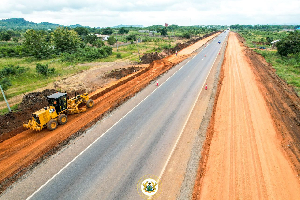Wa, Feb. 22, GNA - The President of the Ghana National Seed Produce= rs Association, Mr Osafo Patrick Apullah, has said that about 80 per cent of poverty in the north would have been reduced if the roads in the north were good.
He said modernization of agriculture would not yield the needed result= s if food produced in rural communities were left to rot due to poor roads. He told the GNA in an interview that peasant farmers were labouring to profit middlemen but were rather poor because they were unable to transport their produce to marketing centres.
Mr Apullah said apart from the Economic Community of West African State= s (ECOWAS) road that runs from Accra to Paga and few other roads such as the Tamale/Yendi road, Wa/Kumasi road and Wa/Jirapa road as well as Bolgatanga/Bawku road that had been tarred the rest of the roads in the northern regions were bad and death traps.
The poor roads were therefore serving as a hindrance to their agricultural production, healthcare delivery and other economic activities. Mr Apullah said for government to achieve its agricultural production targets there was the need to improve the road network in the north to encourage farmers to produce more food.
He also called for the modernization of farmers and the provision of credit facility and farm inputs, especially fertilizers for farmers. "No government can modernise agriculture without first modernizing farmers because farmers are the key to production", Mr Apullah said. He suggest to the government to waive taxes on fertilizers and allow importers to bring the commodity to the doors steps of farmers rather than the present system of issuing chits to farmers to collect it from agricultural officers.
"This practice is associated with discrimination, political alignme= nt and favouritism and these defeat the objective of the government and the aspirations of farmers," he said. Mr Apullah appealed to the government to make farm inputs available to farmers at the appropriate time this year to increase food production.
General News of Tuesday, 22 February 2011
Source: GNA












